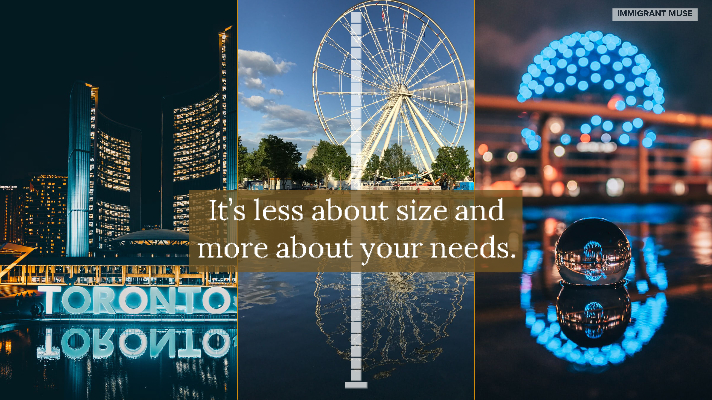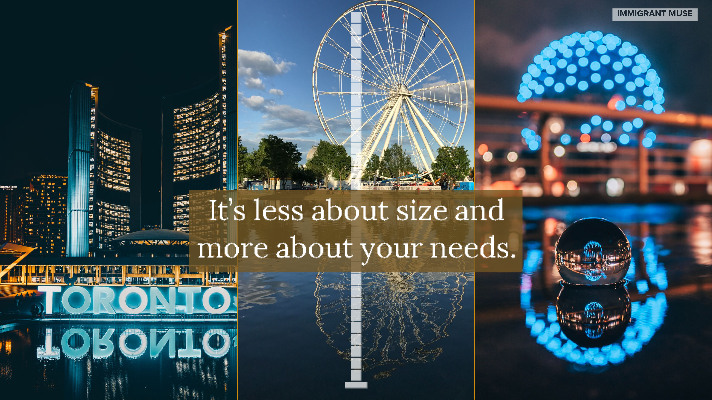Factors to consider before choosing where to live as an immigrant in Canada.
One question that intending Canadian immigrants ask me often is, ‘where should I live in Canada?”. And my answer is often, ‘do your research’. While this answer seem too simplistic for many who were expecting me to mention a specific city or province, the truth is that no one can really answer that question for you. You are the only one who knows what you want and you’re the one who will be left to deal with the outcome of your choice, so why let someone else make that crucial decision for you?
I have come to realise that many who ask that question simply want a push in the right direction. After all, there are ten provinces and three territories in Canada. Moreso, each of these province or territory has at least three popular cities. Naturally, researching where to live in Canada can be an overwhelming task if you don’t know what to look for or where to even begin in the first place.
My hope is that by the time you finish reading this, you’ll be better prepared to begin a fruitful research into where you want to live in Canada.

Before you even begin to research where you want to live in Canada, you need to ask yourself some questions to gain clarity about what you need:
- Do I want to live in a big, medium sized or large city?
- What occupation do I want to practice in Canada?
- Will I need to get more education to practice in Canada?
- Do I have any family or friends in Canada?
- How important is the cost of living to me?
- Am I coming to Canada through a Provincial Nomination Program?
Now let’s go into some details.
Do I want to live in a big, medium or large city?
This may seem like a not-so-important question. But I’ve met people who love big cities and will make whatever sacrifice that is needed to live in a large city while some on the other hand will say they never want to live in a large city. So you need to know what you want when it comes to the size of the city you want to live in Canada or decide if this doesn’t matter. There are only three cities in Canada that qualify as large cities – Toronto, Vancouver and Quebec. If a big city is your thing at all cost, then you have narrowed down your choices to three and if not, you have a ton of options to choose from.
There are upside and downsides to living in a large city though. While there are usually more opportunities in large cities, the cost of living is usually very high and quality of life is low. You also have to compete with more people in the labour market and wait-list to get anything done is usually longer.
Cities in Canada come in different sizes and knowing what size of city you want to live in may be the key in narrowing down your options.

What occupation do I want to practice in Canada?
Making a career choice or a couple of career choices can help you decide where to live in Canada. Do you want to continue with your current career? Do you plan to change career? Is your dream career regulated? Which province or city has limited entry barriers? Which province has more job opportunities in this field? These are some of the questions you need to answer. And to answer some of these questions require some research. The best place to start your research is job bank. You can also sign up for weekly vacancy notification on indeed for each province or city you’re considering. This will not only help you compare which of these provinces has more job vacancies in your occupation of choice but also help you determine the likely requirement from province to province.
While it is good to weigh which province has more job offers, you want to also do a population density analysis. For instance, if Calgary, AB has an average of 50 weekly job postings and Saskatoon has an average of 30, based on the population of these two cities, Saskatoon, SK has more offer because you’ll be competing with fewer people for the available jobs.
Will I need to get more education to practice in Canada?
This question is important because it will help you also research the best schools and programs available in each province. This is especially important if your are not single. As a single person, you can decide to easily move from one province to the other and even enjoy a nice road trip while at it but if you are married, and/or with children, that’s a lot more difficult. So you want to consider all the variables before choosing a province and city from the outset.
Do I have any family or friends in Canada?
Granted, you can survive in Canada without knowing anyone as a new immigrant but trust me, your integration will be much faster if you have a trusted family or friend in Canada to help you along the way (not financially though :)). This is especially true if your connection in Canada is a recent immigrant as well who has been able to find their feet to a reasonable extend. The information they can give you is invaluable and you’ll avoid making the same mistakes they made in their integration and also have some encouragement along the way because this journey can be sometimes discouraging.
By all means, if you have a reliable connection anywhere in Canada and they’re willing to extend a helping hand to you, accept the hand. If that province or city is not right for you, it becomes easier to navigate the journey alone in another city or province.
However, this is not to say you are doomed if you do not have a connection in Canada. Far from it, you’ll be just fine whether you know someone or not. Having a trusted connection only makes integration easier.
How important is the cost of living to me?
Granted, money is not much of a problem for some, so they don’t have to consider the cost of living in the city they plan to live in Canada. However, many immigrants come to Canada with all their savings (which is usually not very much) and even some borrowed funds which they hope to pay back as soon as they hit the jackpot (literally). For these set of immigrants, it’s important to consider the cost of living in the city they plan to live in. It’s important to have at least four months worth of income just in case the green land doesn’t appear so green in the first few months. Google is your best friend for this research.
If the city you have in mind is expensive, you may want to consider a nearby city that’s cheaper and you can commute to the city of your choice if you get a job there or relocate when you find your footing.
Am I coming to Canada through a Provincial Nomination Program?
It’s a given that you have to live in the province that nominated you if you are a provincial nominee. However, I have seen people land in the province that nominated them but end up moving to another province, mostly because they could not find a good job in the province that nominated them. Nonetheless, it is not advisable to leave the province that nominated you, except it is absolutely unavoidable. I have heard experiences of people who were denied citizenship because they were not living in the province that nominated them. Let me know if you need more clarification on this and I can dedicate a full post to it.
After the research is done, never forget to ultimately commit your plans to the Supreme One if you believe in Him. God’s direction and blessings are utmost in this journey. While many believe that there are limited opportunities for growth in smaller cities, I have seen people who lived for years in large cities and ended up getting their dream jobs in smaller cities and had to relocate. I have also seen people who had to relocate from smaller cities to bigger cities to get a good job. It is less about the size of the city and more about whether the city will meet your needs.
Have you decided on where to live in Canada? What other factors did you consider to reach a decision? Let me know in the comment section below.
Cheers to growth!


Thank you, Oyin for sharing this vital information from your wealth of experience.
LikeLike